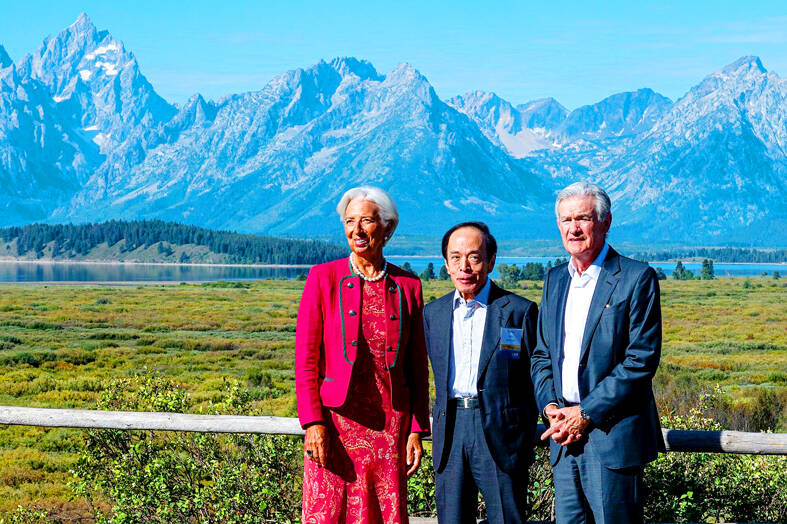Bank of Japan (BOJ) Governor Kazuo Ueda said that price growth remains slower than the central bank’s goal, explaining why officials are continuing with their current monetary-policy strategy.
“We think underlying inflation is still a bit below our target of 2 percent,” Ueda said on Saturday during a panel discussion at the US Federal Reserve’s annual symposium in Jackson Hole, Wyoming. “This is why we are sticking with our current monetary easing framework.”
Annual inflation, as measured by consumer prices excluding fresh food, registered 3.1 percent last month and the rate “is expected to decline toward the end of the year,” Ueda said.

Photo: Bloomberg
Referring to Japan’s economic growth earlier this year, Ueda said it was “to a certain extent a response to a loosening of [COVID-19] pandemic-related restrictions.”
“We think domestic demand is still on a healthy trend, although that’s something that needs to be checked with” third-quarter data, Ueda said.
He did not comment on foreign exchange rates during his address, which was part of a panel on globalization.
He spoke a day after US Fed Chairman Jerome Powell sent the yen down against the US dollar by indicating that US interest rates are likely to stay elevated and might rise further.
Powell said in a Friday speech in Wyoming that the US central bank is ready to tighten again if needed to tame inflation.
Getting inflation down to 2 percent is expected to require softer labor-market conditions and a period of below-trend economic growth, he said.
Toward the end of an about 20-minute talk, Ueda also called China’s recent economic slowdown a “disappointment,” with last month’s data “on the weak side.”
“The underlying problem appears to be the adjustment in the property sector and the spillover to the rest of the economy,” Ueda said of China.
He cited relative strength in the US economy as providing “some offset” to Japan.
Traders are searching for more clues about the policy path of the world’s last anchor of low interest rates. The BOJ loosened a grip on its yield curve control program last month in Ueda’s first surprise move. He denied it was a step toward normalization.
Most BOJ watchers no longer expect any policy change this year as the governor takes time to monitor inflationary pressure, the weak yen and multiyear highs in bond yields. April has become the most popular month for a policy change forecast in a Bloomberg survey.
A government report on Friday showed that inflation in Tokyo slowed below 3 percent for the first time in almost a year, an outcome that supports the BOJ’s view that price growth will cool.
On globalization, speaking of efforts by the US and other nations to diversify trade away from China and shift manufacturing to allied countries, Ueda said that creates uncertainties for the economy and monetary policy.
In addition, he also said that Japan might be at risk of losing out in the global race to attract top companies because it might not have adequate infrastructure.

Taiwan Semiconductor Manufacturing Co (TSMC, 台積電) would not produce its most advanced technologies in the US next year, Minister of Economic Affairs J.W. Kuo (郭智輝) said yesterday. Kuo made the comment during an appearance at the legislature, hours after the chipmaker announced that it would invest an additional US$100 billion to expand its manufacturing operations in the US. Asked by Taiwan People’s Party Legislator-at-large Chang Chi-kai (張啟楷) if TSMC would allow its most advanced technologies, the yet-to-be-released 2-nanometer and 1.6-nanometer processes, to go to the US in the near term, Kuo denied it. TSMC recently opened its first US factory, which produces 4-nanometer

GREAT SUCCESS: Republican Senator Todd Young expressed surprise at Trump’s comments and said he expects the administration to keep the program running US lawmakers who helped secure billions of dollars in subsidies for domestic semiconductor manufacturing rejected US President Donald Trump’s call to revoke the 2022 CHIPS and Science Act, signaling that any repeal effort in the US Congress would fall short. US Senate Minority Leader Chuck Schumer, who negotiated the law, on Wednesday said that Trump’s demand would fail, while a top Republican proponent, US Senator Todd Young, expressed surprise at the president’s comments and said he expects the administration to keep the program running. The CHIPS Act is “essential for America leading the world in tech, leading the world in AI [artificial

REACTIONS: While most analysts were positive about TSMC’s investment, one said the US expansion could disrupt the company’s supply-demand balance Taiwan Semiconductor Manufacturing Co’s (TSMC, 台積電) new US$100 billion investment in the US would exert a positive effect on the chipmaker’s revenue in the medium term on the back of booming artificial intelligence (AI) chip demand from US chip designers, an International Data Corp (IDC) analyst said yesterday. “This is good for TSMC in terms of business expansion, as its major clients for advanced chips are US chip designers,” IDC senior semiconductor research manager Galen Zeng (曾冠瑋) said by telephone yesterday. “Besides, those US companies all consider supply chain resilience a business imperative,” Zeng said. That meant local supply would

BIG INVESTMENT: Hon Hai is building the world’s largest assembly plant for servers based on Nvidia Corp’s state-of-the-art AI chips, Jalisco Governor Pablo Lemus said The construction of Hon Hai Precision Industry Co’s (鴻海精密) massive artificial intelligence (AI) server plant near Guadalajara, Mexico, would be completed in a year despite the threat of new tariffs from US President Donald Trump, Jalisco Governor Pablo Lemus said. Hon Hai, also known as Foxconn Technology Group (富士康科技集團), is investing about US$900 million in what would become the world’s largest assembly plant for servers based on Nvidia Corp’s state-of-the-art GB200 AI chips, Lemus said. The project consists of two phases: the expansion of an existing Hon Hai facility in the municipality of El Salto, and the construction of a